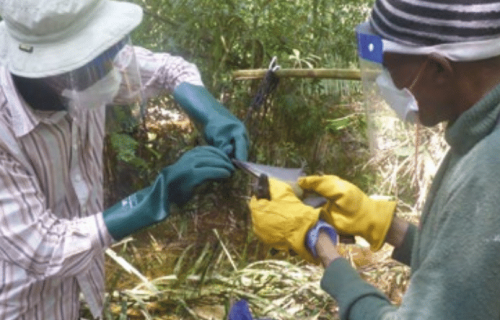BIODIV-AFREID
Home » Partnerships » External projects » BIODIV-AFREID
Home » Partnerships » External projects » BIODIV-AFREID
BIODIV-AFREID
Biodiversity changes in African Forests and Emerging Infectious Diseases: should we worry? (2020-2023, BiodivERsA)
Biodiversity changes in African Forests and Emerging Infectious Diseases: should we worry? (2020-2023, BiodivERsA)
The BIODIV-AFREID project is funded by the EU-Biodiversa programs and runs 2020-2023.
It is carried out by a consortium led by the University of Antwerp and with partners from the RBINS (Brussels, Belgium), University of Kisangani (DR Congo), IRD-TransVIHMI (Montpellier, France), Robert Koch Institute (Berlin, Germany) and One Health for All (Bingerville, Ivory Coast).
Context
Biodiversity in Afrotropical forests is declining dramatically due to deforestation and intensified bushmeat trade. Yet, as recognized by the “One Health” concept, changes in biodiversity can impact human health and wellbeing. There is an increased frequency of outbreaks of emerging infectious diseases (EID) that have a natural reservoir in wild small mammals.
The effect of biodiversity changes on the risk of spillover of these EID to humans is not yet clear. Higher biodiversity may reduce transmission rates in the small mammal community (“dilution effect”) or may facilitate it (“amplification effect”). Biodiversity changes may also be associated with changes in human behaviour that affect contact rates with wildlife. BIODIV-AFREID will explore these relations in different forest sites in DR Congo and Côte d’Ivoire.
Objectives
BIODIV-AFREID will investigate how biodiversity conditions (dis)favour transmissions of infectious agents from small mammals into human populations in African forests. It will:
- link changes in biodiversity to changes in communities of reservoirs and the pathogens they carry;
- link differences in these reservoir communities to human health. The study will include a variety of viruses (Arenaviruses, Coronaviruses and Hantaviruses) but will have a specific focus on two pathogens with an increasing frequency: Ebola and Monkeypox virus. Both are emerging from the African rainforest and cause major concerns for public health.

Through the BIODIV-AFREID project, the relations between biodiversity and emergence of new infectious will be better understood and these insights can form a basis for more targeted conservation and public health strategies. The expected outcome will strengthen international and national authorities dealing with the management of health risks resulting from wild species hunting, bushmeat consumption, and zoonotic agents causing emerging diseases in African tropical lowland forests.




